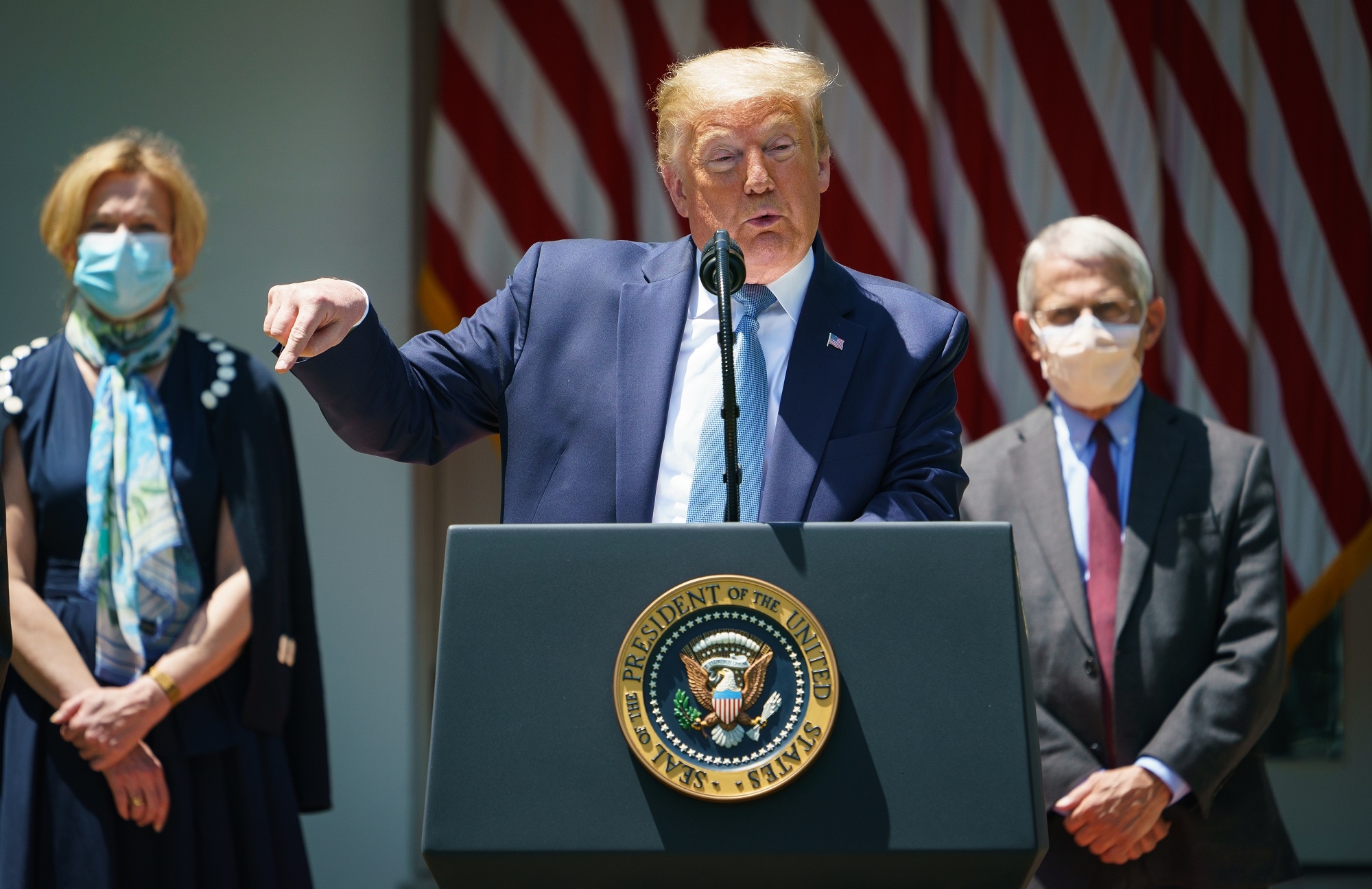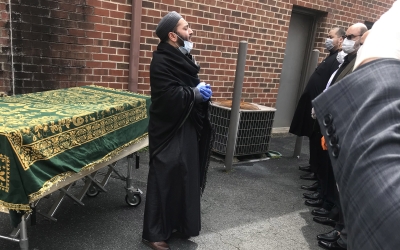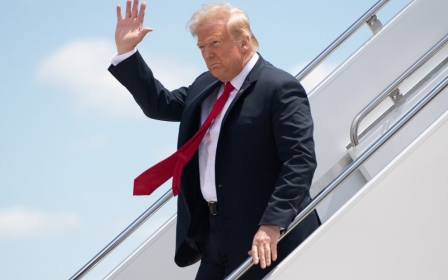Coronavirus: Take in-person classes or go home, US tells international students

The Trump administration has issued a directive threatening to deport student visa holders attending universities that are not offering in-person classes at the start of the new academic year, in the latest attack on the US immigration system that critics say aims to advance a white supremacist agenda.
With many universities refraining from offering in-person classes because of the coronavirus pandemic, US Immigration and Customs Enforcement (ICE), the agency in charge of enforcing immigration regulations, said on Monday that foreign students "attending schools operating entirely online may not take full online course load and remain in the United States".
The regulation will apply to future applicants as well as students already in the US on F-1 and M-1 visas, which allow students to stay in the country for vocational and academic programmes. It does not apply to J-1 visa holders who can work while studying.
"Active students currently in the United States enrolled in such programs must depart the country or take other measures, such as transferring to a school with in-person instruction to remain in lawful status," ICE said in a statement.
"If not, they may face immigration consequences including, but not limited to, the initiation of removal proceedings."
New MEE newsletter: Jerusalem Dispatch
Sign up to get the latest insights and analysis on Israel-Palestine, alongside Turkey Unpacked and other MEE newsletters
MENA students at risk
Abed Ayoub, the legal director of the American-Arab Anti-Discrimination Committee (ADC), said the intent of Donald Trump was to force students on temporary visas to leave the country as most campuses have announced they will not be holding in-person fall classes.
"This is another attack on the immigration process and on immigrants in the US. It is a backdoor way to attack student visa holders, something that the administration has been targeting for a while now," he told MEE.
Ayoub said the new decree will disproportionately impact Arab students who have saved money to stay in the United States for the duration of their studies.
"Circumstances at home are always changing. You have students from Lebanon, for example, who may not be able to return to a country they knew before they came here," he said.
Lebanon's economy took a sharp downturn earlier this year, with local currency losing as much as 80 percent of its value compared to the US dollar causing shortages in basic goods, including fuel and food.
The crisis has deepened existing power cuts with some areas seeing merely a few hours of electricity daily.
"Students have taken every step to be here, so going back really burdens them and makes their life difficult," Ayoub said.
"Let's say a Lebanese student has to go back to take online courses, how are they going to do that when the country of Lebanon doesn't even have power. How is the person who's taking online classes supposed to connect to the internet - something you take for granted here."
'Targeting people of colour'
Lebanon is far from the only country in crisis in the Middle East and North Africa region. Neighbouring Syria is also suffering from a stark economic downfall on top of its ongoing civil war; the conflict in Yemen is still raging; oppression is escalating in Egypt; and Iran is suffering from a possible second wave of Covid-19.
Azadeh Shahshahani, legal director at the Atlanta-based Project South, described the move as "truly awful", saying that it demonstrates the administration's attempt to advance its white nationalist agenda.
"International students are being forced to choose between their safety and leaving the United States and their studies behind. Only a government motivated by racism and xenophobia would come up with such a harmful policy," Shahshahani told MEE.
"From the Muslim ban to asylum restrictions to suspension of work visas to green card restrictions, every day there's a new thing targeting people of colour."
According to the Institute of International Education, there are more than 81,000 international students from the Middle East and North Africa at American universities.
International students attending US universities are generally prohibited from taking online classes exclusively, but the Trump administration suspended those conditions earlier this year amid the spread of the pandemic.
However, while certain countries have managed to curb the spread of the virus, Covid-19 cases are still on the rise in many places, including several US states.
Students fearful
Maria Pia Matos, a 22-year-old student of law and public policy at East Los Angeles College, said she simply cannot return to her native Peru with loans to pay back and a lease to fulfil.
"I don't know what to do honestly. If I go back home. I’ll lose everything and might not be able to come back again in a long time," Matos told MEE.
She said the US administration is "totally heartless".
"I'm disappointed to see all the effort I put on my career to be completely destroyed by this cruel man," she said referring to Trump. "I still need to wait for my school to say something about it. But I’m very scared."
Moreover, Matos said her family is no longer in the South American country.
"My mom and brother moved to Italy last year and now Italy has banned anybody that comes from America," she said. "I have nowhere to go, it would be fine for me if we weren't in this pandemic. I'm afraid for my own safety."
Critics of the new policy are already calling on universities to establish in-person classes that would allow foreign students to meet the requirements to remain in the country.
"Every university or college fully online must now create a course entitled 'That was America' to be offered for only two one-hour in person sessions a semester for international students only. Masks must be worn. Do it," former Obama administration official Juliette Kayyem said in a tweet.
But with positive Covid-19 cases on the rise, gathering in classrooms remains a risky prospect for many teachers and students.
'Unjust rule'
Matthew Stiffler, a lecturer in Arab and Muslim American studies at the University of Michigan, said ICE is trying to enforce an "unjust rule" that puts a strain on the entire academic system.
He said besides being cruel to students, the directive puts additional pressure on universities and professors, many of whom have families and may be vulnerable to the virus.
"My hands are tied, and it's just an awful position to be in that I can't help my students," Stiffler told MEE.
Mahsa Khanbabai, an immigration lawyer based in Boston, told MEE that the directive will "particularly affect Middle Eastern and Chinese students.
"The chances that they'll be able to get a visa to come back are nearly non-existent."
The American Civil Liberties Union, an advocacy group, was quick to condemn the new directive.
"Once again, this administration is exploiting the pandemic to target even more people, simply because they are immigrants," the group said on Twitter.
"ICE should immediately rescind this guidance and let students continue their education."
US politics and the pandemic
The handling of the pandemic became a political issue in the US since the early days of the outbreak, with Democrats accusing Trump of not doing enough to slow down the spread of the virus and Republicans arguing that liberal governors were overreaching in their lockdown orders.
Even the simple act of wearing a mask has become a partisan matter with many conservatives criticising face-covering regulations.
In fact, hours before ICE released its statement on Monday, Trump called for schools to reopen. He wrote on Twitter: "SCHOOLS MUST OPEN IN THE FALL!!!"
Many top Democrats denounced the administration's move on Monday.
"The cruelty of this White House knows no bounds. Foreign students are being threatened with a choice: risk your life going to class in-person or get deported," said Senator Bernie Sanders. "We must stand up to Trump's bigotry. We must keep all our students safe."
Elizabeth Warren, a Massachusetts Senate Democrat, said the policy was "senseless, cruel, and xenophobic.
"Kicking international students out of the US during a global pandemic because their colleges are moving classes online for physical distancing hurts students," she said on Twitter.
Middle East Eye delivers independent and unrivalled coverage and analysis of the Middle East, North Africa and beyond. To learn more about republishing this content and the associated fees, please fill out this form. More about MEE can be found here.






